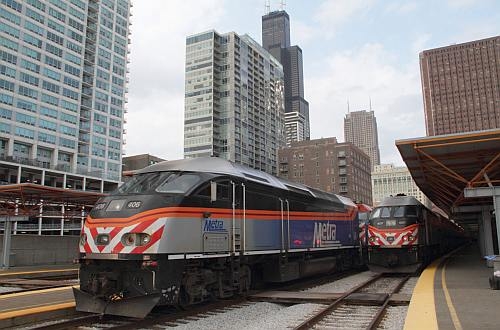The programme foresees the purchase of 367 new coaches to replace 318 coaches which have an average age of 43 years, leaving 49 vehicles in reserve. In addition 85 locomotives in the fleet will be rebuilt up to 2024 at an estimated cost of $US 178.5m, extending their life by around 25 years, while 52 new locomotives will be purchased in 2020 for delivery from 2020 to 2024 at an estimated cost of $US 416m.
The plan calls for delivery of 106 new coaches between 2018 and 2019 and 261 between 2020 and 2024. Combined with the 160 new Highliner coaches, which are currently being delivered by a consortium of Sumitomo and Nippon Sharyo under a $US 577m contract signed in August 2010, the new additions will reduce the average age of the fleet to 16.8 years in 2024.
Metra will fund the modernisation programme by issuing its own bonds – the first in its history – or employing similar financing, starting with $US 100m in 2015, which will be followed by similar amounts in 2017, 2019 and 2022. The plan assumes that current state and federal funding sources will account for $US 710m of the $US 2.4bn programme over the next 10 years, with Metra meeting $US 400m of the costs from its own sources.
A portion of the 10.8% fare increase included in Metra's proposed 2015 operating budget will pay for debt servicing on the first $US 100m, and Metra has offered projections of fare increases for the next 10 years that will meet its costs. It estimates that its passengers will pay for 16% of the plan, and by taking the lead to fund its capital needs through financing, it hopes to convince government leaders to provide the additional financing it requires.
"Folks may love nostalgia, but it makes a powerful statement when our oldest coaches date from the Eisenhower administration," says Metra board chairman Mr Martin Oberman. "The majority of our rail cars are older than the majority of our daily commuters. While nobody ever likes fare increases, Metra's fares are significantly lower than our peer railways in major cities and have not kept pace with inflation. In addition, it's time we do this right. We have to stop pretending that our costs do not go up every year, just like they do for everything else."
Metra says its capital needs currently far exceed its capital resources. According to the Chicago Regional Transport Authority (RTA), Metra needs $US 9.9bn over the next decade to achieve and maintain a state of good repair on its system, and it can expect around a quarter of this from the federal government.
Oberman says the gap between its resources and its requirements forces Metra to focus on its immediate needs, which is replacing its rolling stock. The plan does include a $US 20m provision to improve facilities at its 49th Street depot where the majority of the $US 341m coach rehabilitation work will take place, including increasing the capacity of the facility to maintain 60 coaches compared with 40 at present. However, additional plans are required to address the longevity of track, structures, signals facilities, stations and parking.
"We expend a huge amount of resources – time, staff and money – on timely and extensive maintenance so that even our "vintage" rolling stock is completely safe," says Metra executive director and CEO Mr Don Orseno. "But, as the old saying goes, is this really the way to run a railroad? Safety will always be our number one priority, but being modern and comfortable is important too – especially if we want to continue attracting riders because they want to use Metra, not just because they have to."

